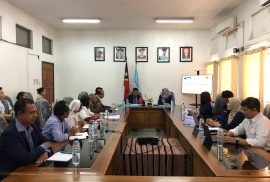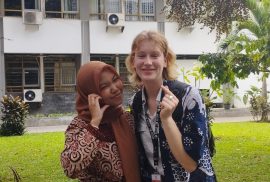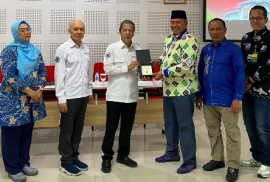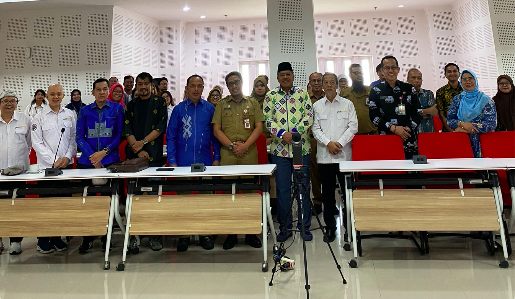Dili, Timor-Leste, February 12, 2026 – Universitas Gadjah Mada (UGM) held a cooperation meeting with Universidade Nacional Timor Lorosa’e (UNTL) on Thursday (12/2) at 11:00 a.m. local time. The meeting marked an initial step in exploring strategic collaboration in the fields of culture, language, literature, history, and tourism.
The UGM delegation was warmly welcomed by Ms. Celine, a 1992 Biology alumna of UGM, and Prof. Armindo Maia, the first Rector of the former Universitas Timor Timur, now UNTL. The meeting took place in a cordial atmosphere, highlighted by an exchange of experiences from their time studying in Yogyakarta, reflecting the long-standing historical ties between the two institutions.
In the opening session, UNTL presented the history of its institutional relationship with UGM, including the establishment of the Indonesian Cultural Studies Center, which holds significant potential to be further developed as a platform for collaboration in the tridharma of higher education—education, research, and community service. The meeting was attended by UNTL’s leadership, including the Rector, Vice Rector for Cooperation, university founders, Head of the Cultural Studies Program, Dean of the Faculty of Philosophy, Dean of the Faculty of Tourism, and representatives from other faculties.
UNTL Rector, Prof. Dr. Eng. Joviano António da Costa, M.Eng., expressed the institution’s commitment to strengthening university-to-university (U2U) partnerships, particularly in the areas of culture, language, tourism, and related disciplines that offer mutual benefits.
As Head of the UGM Delegation, Prof. Dr. Muti’ah Amini presented the profiles of academic programs within UGM’s Faculty of Cultural Sciences, along with several ongoing academic initiatives. She also highlighted UNTL’s strategic plan to develop its History Study Program through collaboration with UNESCO and UGM’s History Study Program. This collaboration is considered strategically important for strengthening academic capacity, curriculum development, and research quality enhancement.
Beyond the field of history, UNTL emphasized the need to strengthen human resources in the tourism sector, including human resource management, attraction management, and destination development. The Dean of the Faculty of Tourism at UNTL noted that opportunities for joint research and collaborative publications are widely open and have the potential to provide substantial contributions to both institutions. The Dean of the Faculty of Education also expressed hope that the faculty would be integrated into the cooperation framework currently being formulated. Meanwhile, the Dean of the Faculty of Arts and Culture, Ms. Celine, underscored the urgency of cross-regional research collaboration in arts and culture to enrich academic perspectives and strengthen international networks.
Both parties agreed that the signing of a Memorandum of Understanding (MoU) would serve as an essential initial step to ensure that the implementation of collaborative programs proceeds legally, systematically, and sustainably across the agreed fields. This collaboration aligns with the commitment to achieving the Sustainable Development Goals (SDGs), particularly SDG 4 (Quality Education) through academic capacity building and knowledge exchange, SDG 8 (Decent Work and Economic Growth) through competency-based tourism sector development, and SDG 17 (Partnerships for the Goals) through strengthened international cooperation networks.
The meeting concluded with a shared commitment to continue dialogue in order to further strengthen the historical, academic, and programmatic ties between UGM and UNTL, while expanding both institutions’ contributions to the advancement of knowledge and culture in Southeast Asia.
Contributor : Adwiya S. Yoga, S.Pd., M.A.
[Public Relations FIB UGM, Alma Syahwalani]







